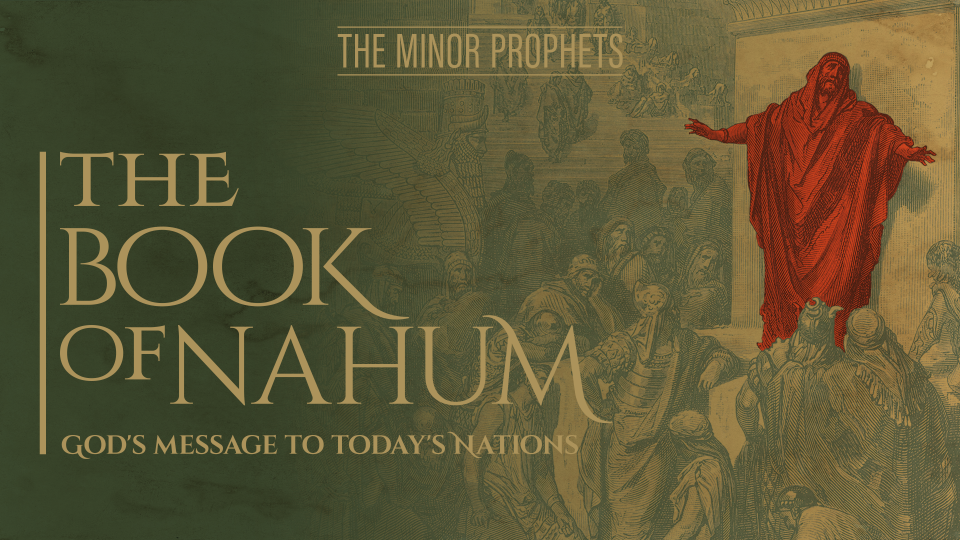נַחוּם
Nahum
"comfort"
The verb root נחם has the meaning, "to console, comfort." (See Nehemiah)

Used with permission. ©2021 United Church of God, an International Association. https://www.ucg.org/beyond-today/beyond-today-bible-study/the-minor-prophets
Introduction
The Book of Nahum is the seventh book of the 12 minor prophets of the Hebrew Bible.
Author
The book is attributed to the prophet Nahum.Little is known about Nahum's personal history. He was from the town of Elkosh or Alqosh (1:1), which scholars have attempted to identify with several cities, including the modern `Alqush of Assyria and Capharnaum of northern Galilee.He was a very nationalistic Hebrew, and lived amongst the Elkoshites in peace.
Date
His writings were likely written in Jerusalem in about 615 BC, before the downfall of Assyria.
The rest of this comprehensive Wikipedia article on the book can be read here.
An extract from the notes found in BHFA, Volume 5.
Nahum 2:12b
וּמְחַנֵּק לְלִבְאֹתָיו
for his lionesses and strangle
KJBand strangled for his lionesses,
NASBKilled enough prey for his lionesses,
ESV and strangled prey for his lionesses;
NLT and strangled prey for his mate.
NIV and strangled the prey for his mate,
וּמְחַנֵּק
Waw consecutive + pi'el part. act. m. sg. of the verb חָנַק meaning,"to strangle." This form occurs only here in the Hebrew Bible. Another form from the same verb root but in the niph'al binyan is found in 2 Sm 17:23, and also occurs only this once.
The use of this Hebrew word is in accordance with the killing strategy of the spotted cats. Instead of attempting to fatally wound their prey, the would rather clamp their powerful jaws around the throat of the prey and so prevent it from breathing. They would then focus on maintaining their grip, and patiently wait for the prey to be suffocated (strangled) to death.
לְלִבְאֹתָיו
Prep. + noun f. pl. + suffix 3ms meaning, "his lionesses." There are three variations from the stem לבא meaning, "lioness." This stem is used 20 times in the Hebrew Bible (Ez19:2, Gen 49:9, Nm 24:9, Jb 4:11).
English translations
Some modern English translations (NIV, NLT) have changed the plural “lionesses” to the singular “mate." This could be to reflect their belief that, contrary to other African subspecies, these lions did not gather in prides due to a lack of prey in its arid surroundings and therefore ought to be monogamous.
As can be seen in many instances elsewhere, the authors of the Hebrew Bible were naturalists (Job 40) and more specifically ornithologists (Gen 6-8, Job 39) par excellence. Therefore, there is no reason to doubt that this author carefully observed the behaviour and social structures of this species and thus deliberately used this particular verb and the plural form of the noun.
Lions in the Hebrew Bible
Lions are mentioned 189 times in the Hebrew Bible. Apart from the above word, the following words are used to describe lions.

Male Barbary Lion (Image source here)
אֲרִי
Noun, m. sg. meaning, "lion." This is a generic term for the animal, and used 78 times in the Hebrew Bible (Am 3:12, 2 Sm 23:20, Lam 3:10, Ps 22:17).
אַרְיֵה
Noun, m. sg. meaning, "lion." This is variation of the above generic term, andused 47 times in the Hebrew Bible (Am 3:4, Jgs 14:8,8,9, 1 Kgs 13:24, 25, 26,28).
כְּפִיר
Noun, m. sg. meaning, "young lion." This noun appears 32 times in the Hebrew Bible (Samson in Jgs 14:5).
שַׁחַל
Noun, m. sg. meaning, "lion." This noun appears seven times in the Hebrew Bible (Hos 5:14, Jb 4:10).
לַיִשׁ
Noun, m. sg. meaning, "lion." This noun appears three times in the Hebrew Bible (Jb 4:11, Is 30:5, Prv 30:30).
גּוּר
Noun, m. sg. meaning, "whelp." This noun appears seven times in the Hebrew Bible (Gen 49:9; Ez 19:2,3,5).
גּוֹר
Noun, m. sg. meaning, "whelp." This variant spelling of the above mentioned noun appears twice in the Hebrew Bible (Jer 51:38, Na 2;13).
There has been much debate and controversy among zoologists on the taxonomical classification of lions. For the sake of this discussion we will accept that the lions of the Hebrew Bible are the Barbary lion (also called North African lion, Berber lion, Atlas lion, and Egyptian lion).
African lion taxonomy
Kingdom: Animalia
Phylum: Chordata
Class: Mammalia
Order: Carnivora (flesh eating)
Family: Felidae (cats)
Sub-family: Pantherinae (spotted cats)
Genus: Panthera (P), including tiger (P. tigris), lion (P. leo), jaguar (P. onca), leopard (P. pardus), and the snow leopard (P. uncia). The latter belongs here but unlike the others, cannot roar.
Species: African lion (Panthera leo leo).
Subspecies: P. leo barbarica, P. leo nubica & P. leo somaliensis
The Barbary lion (P. leo barbarica), is an extinct population that lived in the Barbary Coast region of the Maghreb from the Atlas Mountains in Morocco to Egypt. They were eradicated following the spread of firearms and bounties for shooting lions. Small groups may have survived in Algeria until the early 1960's, and in Morocco until the mid-1960's.In 19th century hunter accounts, the Barbary lion was claimed to be the largest lion, with a weight of wild males ranging from 270 to 300 kg (600 to 660 lb).
Refer to Jeremiah 13:23 for a discussion of "leopards" in the Hebrew Bible.
AN EXTRACT FROM THE NOTES FOUND IN BHFA, VOLUME 5.
Nahum 3:13a
הִנֵּה עַמֵּךְ נָשִׁים בְּקִרְבֵּךְ
in your midst women your people look!
NLT Your troops will be as weak and helpless as women
NIV Look at your troops-- they are all weaklings.